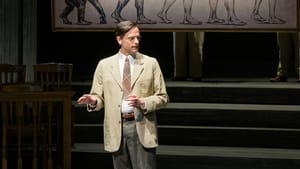Stay in the Loop
BSR publishes on a weekly schedule, with an email newsletter every Wednesday and Thursday morning. There’s no paywall, and subscribing is always free.
It could be tomorrow
The Resident Ensemble Players presents ‘Inherit the Wind’

Inherit the Wind is a big play in a big production. Mounted by the Resident Ensemble Players (REP) at the University of Delaware, its huge company of 46 (including 18 professional actors) might be a throwback in size to another theatrical era, but its ideas are still current and cogent.
Director Sanford Robbins has set the play as directed in the first edition forward: “It might have been yesterday. It could be tomorrow.” The script, one of the most successful works in the 50-year collaboration of playwrights Jerome Lawrence and Robert Edwin Lee, is a fictionalized retelling of the famous 1925 Scopes “monkey trial."
The play presciently explores the (still ongoing!) debate between creationists and Darwinian evolutionists. The 1950s playwrights boldly stated their real and not-so-subtext: They dramatized a historical situation to comment on then-rampant McCarthyism. Robbins stages the production with an operatic scope to match the sweep of the playwrights’ interwoven intellectual threads—freedom of thought versus containment of ideas; one man ossifying while another broadens; small-town proscriptions contrasted with what has come to roost there.
A jailed teacher
Set in an unnamed Southern town, the play opens as Rachel Brown (Kristen Alyson Browne) comes to visit fellow teacher and sweetheart Bert Cates (Michael Gotch) in jail. Cates is being held awaiting trial for teaching Darwin’s theory in his classroom, in contravention of state law.
His upcoming trial will pit famous Bible-quoting prosecutor Matthew Harrison Brady (Stephen Pelinski) against equally famous defense lawyer Henry Drummond (Lee E. Ernst, characters based on William Jennings Bryan and Clarence Darrow. Led by Rachel’s father, Reverend Jeremiah Brown (a fiery Hassan El-Amin), the small town is seething with religious fervor and righteous excitement at the clash of these two legal titans.
The culminating dramatic trial scene pits the two lawyers—former friends and colleagues—in a war of words and ideas in front of a prejudiced jury, watched by the townspeople who crowd into the courtroom to witness a once-in-a-lifetime showdown.
Force and focus
Both Pelinski and Ernst are masterful in these powerhouse roles. Pelinski explores the uncertainty and disappointment behind Brady’s bombast and brimstone, while Ernst cannily builds moment by moment to the inevitable courtroom finale. The play—a well-made script of the type rarely written and not that frequently staged today—is filled with intellectual constructs and verbal thrusts and parries that would surely prove tedious in actors without the force and focus of these two men.

Providing cynical world-weary commentary that runs through the play like a Greek chorus is hard-boiled, hard-hitting social critic E.K. Hornbeck (Mic Matarrese in the role originated by Tony Randall). The slick Hornbeck is based on outspoken Baltimore writer H.L. Mencken, and though he crafts an effective characterization, Matarrese sometimes hits too hard and too stridently.
Through the simple act of teaching what he believes, Cates the thoughtful teacher becomes an unlikely hero. Gotch—often lauded for his juicy take on roles—here creates an understatedly eloquent character whose courage is unexpected, even to himself. As Rachel—who bears the intellectual arc of change in the play—Browne has the requisite youthful demeanor and small-town naivete, but the range and depth shown by the company’s experienced actors elude her.
Scenic designer Linda Buchanan has created a set that works best for the trial. The judge’s bench perches high above the courtroom, and towering grey walls elevate the setting to match the drama’s elevated themes. The production opens with an onstage four-piece town-hall band (tuba, trumpet, trombone, and bass drum) that underscores the action with Lindsay Jones’s evocative period compositions under Ryan Touhey’s musical direction.
“The right to think”
Originally, Inherit the Wind was turned down by multiple producers, its social philosophy not deemed commercially viable. Its Dallas premiere in January 1955 was produced by the legendary Margo Jones. It then went on to a spring production in Philadelphia and later that year became a Broadway hit and a theatrical staple translated into 33 languages.
The play is often mistakenly considered a work of record, the playwrights congratulated for capturing historical speeches or incidents that they had altered or created. Robbins mounted this classic play in the belief that its ideas are still relevant even after 90 years, and he was right. As Lawrence himself said, the play is “not about science versus religion; it's about the right to think.” He was right, too.
What, When, Where
Inherit the Wind. By Jerome Lawrence and Robert Edwin Lee. Directed by Sanford Robbins. Through March 24, 2019, at the Resident Ensemble Players, Roselle Center for the Arts at the University of Delaware, Newark, DE. (302) 831-2204 or rep.udel.edu.
The Roselle Center for the Arts is a wheelchair-accessible venue. To learn more about accessibility or request accommodations, call the box office or email [email protected] at least five days in advance of the performance.
Sign up for our newsletter
All of the week's new articles, all in one place. Sign up for the free weekly BSR newsletters, and don't miss a conversation.

 Gail Obenreder
Gail Obenreder